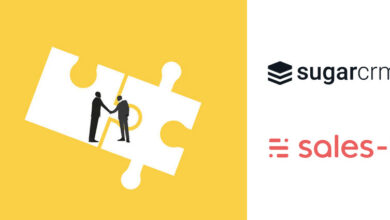What You Need To Know About Salesforce Certifications

The Gist
- CRM expertise amplified. Salesforce certifications increase expertise and open doors to rewarding career opportunities in sales, marketing and CRM management.
- Continuous learning. Staying updated with the latest Salesforce certifications is crucial for maintaining a competitive edge and driving innovation.
- Gateway to Salesforce Economy. Investing in certification offers global recognition, career advancement and lucrative job prospects.
Editor’s Note: This article has been updated on May 16, 2024 to include new data and information. The original content was authored by Dom Nicastro.
Salesforce was named the top Customer Relationship Management (CRM) provider for the tenth consecutive year by International Data Corporation (IDC), as reported in the 2023 edition of the Worldwide Semiannual Software Tracker.
The platform’s market share grew over the last year, and the company increased its revenue more than any other CRM vendor in 2022 over 2021. The popularity of the platform is one of many reasons Salesforce certifications are in high demand.
As of Jan. 31st, 2024, Salesforce had 72,682 employees. In its latest annual report, it stated revenues of $34.86 billion, an increase of 11% year-over-year. Those are impressive figures for a software company, but it’s software that is used by thousands of organizations all over the world.
Software isn’t the only thing the company provides, though. It also offers many certifications employees can use to demonstrate their skills. These certifications help people find employment working on or around the Salesforce ecosystem.
What Is Salesforce Certification?
Salesforce currently offers more than 50 certifications across seven roles. Some of its most sought-after certificates include:
For Salesforce Administrators: Marketing Cloud Administrator: The Salesforce Marketing Cloud Administrator credential shows that a person understands how to configure Marketing Cloud products. It covers industry standards and Salesforce-specific best practices. Administrators manage the security of Salesforce and keep it running well on a daily basis.
For Salesforce Developers: JavaScript Developer I: This programming-related specification shows developers have experience with developing both front-end and/or back-end JavaScript applications. It also shows an understanding of Lightning Web Components and other JavaScript-related technologies. Some developers take this certification as a part of a group of qualifications to show an understanding of the full web development stack.
For Salesforce Architects: Technical Architect: The Technical Architect solves complex, large-scale customer challenges to deploy secure, scalable and high-performance solutions that maximize the full potential of the Salesforce platform. Architects are responsible for building custom implementations and managing their rollout.
For Salesforce Marketers: Marketing Cloud Developer: This Salesforce cloud certification for marketers offers hands-on experience developing across the full platform. They create personalized, dynamic messages and landing pages, and are fluent in Marketing Cloud scripting languages. They’re also experienced in advanced customer segmentation, reporting and analytics and data configuration.
For Salesforce Designers: User Experience (UX) Designer: Intended for those aspiring or experienced designers who want to design human-centered experiences on the Salesforce Platform.
Related Article: Salesforce Expands AI Arsenal With New Marketing Tools and Partnerships
Why Invest in Salesforce Certifications?
Investing in a Salesforce certification course, or getting an SFDC certification, can help you build a more rewarding career. If you’re serious about sales and marketing, having proof of your Salesforce expertise could help you land a better job in those fields. Certifications can also help you transition from sales or marketing to working as a Salesforce administrator or developer. The platform is in demand worldwide, and typical salaries reflect that:
- Salesforce Administrator: $131,750
- Salesforce Developer: $155,125
- Salesforce Consultant: $155,750
- Salesforce Project Manager: $152,125
- Salesforce Business Analyst: $144,750
- Salesforce Technical Architect: $200,000
When you consider most entry and mid-level Salesforce certifications cost less than $500, earning a certification like this may make sense. If you’re already in a sales and marketing-related role, earning a certification could help you earn more money and standout among other candidates.
Salesforce Certifications are updated on a regular basis. It’s always a good idea to research the latest certifications to see which are the most valuable for your desired job.
Certifications Provide Industry Recognition and Career Advancement
Salesforce certifications are globally recognized credentials. Being certified offers a competitive edge that leads to new opportunities with current or future employers.
Salesforce certifications allow you to:
- Become recognized as a Salesforce industry expert
- Show your commitment to personal and professional improvement
- Become a key player in your organization’s success by implementing best practices across the latest Salesforce rollouts and releases
- Find employment opportunities with large, respected companies
- Advance your career within your current company or as a consultant
A certification in Salesforce helps people land jobs in the “Salesforce Economy.” IDC reports that the adoption of Salesforce AI-powered cloud solutions alone will create 4.7 million direct jobs — and 7 million indirect or induced jobs — between 2022 and 2028. In a time when many industries are struggling, sales, marketing and knowledge work can offer stability and progression opportunities.
How to Use Salesforce Trailhead Certification Help
There are many different niches and job roles within the world of Salesforce. This means the platform can be a good fit for a variety of skill sets and interests. Whether you’re technical, creative or people-focused, you may be able to find a Salesforce-related job role that is of interest to you.
Anyone can explore which career in the Salesforce ecosystem is a good fit for them, said Kristine Lande, SVP of marketing and community at Salesforce, and previously SVP of the Trailblazer Ecosystem. They can review a breakdown of required Salesforce skills for each role, day-to-day work and projected career growth and salary information.
There are more than 50 different Salesforce certifications on offer, and each one serves as a step along a clearly defined career path. The certifications give learners the knowledge, experience and skills they need for a specific job. Some certifications cover tools such as Visualforce or Salesforce Lightning, others focus more on using the service or on data management.
Free Tools To Help You Learn
Salesforce offers a free online learning platform, called Trailhead. This platform features learning modules and guided projects to help students practice the skills they’ll use in the real world. Unlike many other test-prep platforms, Trailhead doesn’t just focus on technical skills. Users also learn the soft skills they will need to be successful as a professional in sales and marketing.
The most useful feature of Trailhead is the ability to try test scenarios and complete tasks based on real-world scenarios in the Trailhead Playground. The Playground is a free instance of Salesforce where learners can test their skills, so they’ll retain knowledge more easily.
In addition to Trailhead’s self-paced learning, would-be Salesforce professionals can also join expert-led Trailhead Academy courses, Salesforce Certification Days and Virtual Bootcamps. These learning options help students connect with the wider Trailblazer community. Attending events is a chance to meet mentors and other students in your area, and get some more intensive guidance and support.
Extra Tools to Study for Salesforce Certifications
There are many online tools that can help people study for a Salesforce-related certification. Other than Trailhead, students can learn from online videos on YouTube or study guides and advice on certification-focused forums.
The basic Salesforce examinations use multiple-choice questions. It’s possible to take practice exams and get a feel for where you stand and on which areas you need to focus. Many people who have some existing experience with Salesforce through their work use a bootcamp-style method to prepare.
If you have prior Salesforce experience, it’s possible to prepare for the entry-level examinations with a week or two of study. Consider practicing in the Trailhead Playground, to prepare for the test. This kind of intensive preparation helps you learn the material and gives you the best chances of successfully passing the multiple-choice exam the first time.
If you’re the sort of person who struggles with exams, taking practice tests can be invaluable. The Salesforce Certification is about product knowledge and best practices. There are no trick questions. A professional who knows the ecosystem well should not struggle to pass the test. However, if you’ve been out of academia for a while, practice tests may be helpful.
Related Article: Salesforce Joins the Battle for Smart CRM Dominance With Launch of Einstein GPT
How Much Does Salesforce Certification Cost?
The cost of salesforce certifications vary depending on the level of the module. Salesforce lays out its certification prices here, with individual certificates ranging from $75-400, with retakes sometimes offered for free and others costing up to $200 each. There is one certification, Salesforce Certified Technical Architect, that costs $4,500 with a $2,250 retake fee.
Each certification includes resources to help learners prepare for their exams. Those resources include:
- An exam guide that lists the topics covered on the test
- A list of relevant Trailhead learning modules
- Recommendations for Trailhead Academy Courses
- Interactive study tools
In addition to the support that’s included in the certification’s price, there is a lot of free support available. Salesforce offers test prep and one-day boot camps via Trailhead. These resources can help those who are just getting started in the industry figure out whether Salesforce certifications are right for them.
“Becoming a member of the Salesforce Certified community reflects a commitment to constantly learning and growing your career,” Lande said. “The learning never stops. Salesforce releases innovative features three times per year. Certification holders are required to keep their skills sharp by annually maintaining their certification.”
To do this, all Salesforce-certified professionals must successfully complete one Trailhead maintenance module per year. Maintenance modules are offered alongside the start of the spring, summer and winter release cycles. These modules should be completed within one year of becoming available.
How to Get Salesforce Certified
Those who complete a Salesforce program will need to pass a final exam to get certified. The pass rates for Salesforce exams vary depending on the level of the examination. If you’ve followed the training programs provided in Trailhead you should have a high chance of passing the first time.
However, if you fail the certification, you can retest after you pay half of the initial test fee. You can retake the exam as many times as you like, although the retest fee is payable each time.
Complete every training course you can on Trailhead, and answer all of the practice tests you can find. Take advantage of having access to the Trailhead playground to experiment with Salesforce administration as much as possible.
Your exam prep information will give you a list of prerequisite knowledge for each certification. It will also recommend modules for you to study on Trailhead. Make sure you’re confident you know all of the content before you book your test.
How to Increase the Chances of Passing Your Salesforce Exams
Whether you’re hoping to become certified as a developer, administrator or architect, hands-on experience is essential. If you’re lucky enough to be working in an environment where Salesforce is already in use, you can hone your skills on the job. If not, use your time in the Trailhead Playground wisely. Try out every real-world scenario available so that when you do start work as a Salesforce specialist, you’ll feel confident in your skills.
Take advantage of any opportunities you have to connect with the Salesforce community too. Depending on where you live that may mean traveling for conferences, attending community days and meetups in your local area or simply communicating online. There’s a large community including developer advocates and users who can help you learn the skills you’ll need for your day-to-day career.
What’s New In Salesforce Certifications for 2024?
Salesforce periodically launches new certifications. There are now more than 50 certifications to choose from.
The Salesforce Associate Certifications are brand new, offering entry-level credentials for those who have zero to six months of Salesforce experience. There are currently three Associate-level certifications, including:
- AI Associate
- Salesforce Associate
- Marketing Associate
Even entry-level Salesforce Certifications are very much in demand. These are foundational certificates that indicate someone has the knowledge required to extend the capabilities of the Salesforce platform.
There’s no single “correct” collection of Salesforce certificates. Each expert can carve their own career path, choosing to focus on design, architecture or administration as their interests evolve.
“A valuable aspect of the Salesforce Certification Program is that the learning paths build upon themselves,” Lande said. “In fact, many Salesforce Certified Administrators successfully accelerate their career opportunities and move on to become Salesforce Certified Developers and even Architects.”
The Mason Frank International Salesforce Salary Survey found the most popular certification is the Salesforce Certified Administrator. Around 90% of respondents had passed the examination for that certificate. The Certified Platform App Builder certification is the next most popular, being held by 50% of respondents.
The Salesforce ecosystem has grown significantly over the last few years, and the pace of growth is likely to continue. Salesforce empowers companies and their sales staff. Demand for those who can build new tools and systems on top of the platform is growing.
Popular Certification Pathways for Salesforce Specialists
Daljit Bamford, chief customer officer at Salesforce recruiter Mason Frank International and former chief customer officer at Salesforce, said she made the decision to work toward her Advanced Admin certification while simultaneously implementing Sales Cloud. “And I’ve never looked back,” she said. “My career within the ecosystem has gone from strength to strength, and it started with that first certification. Do I still think certifications are important? Absolutely.”
Deciding which Salesforce Certificates to earn can be tricky. For someone who is at the beginning of their career, one good option would be to start with the Salesforce Certified Administrator qualification. This could be enough to land an entry-level job as a Salesforce administrator. From there, the Salesforce Certified Advanced Administrator qualification could help an admin earn much-desired promotions.
Certifications for Developers
For developers, the route can be more varied. Many Salesforce developers come from a programming background already and have other vendor-specific certifications in their portfolios. One popular set of certificates is:
- Cloud Digital Developer
- Salesforce Certified Platform Developer I
- Certified Platform Developer II
These certificates can be combined with User Experience, Javascript or other certifications to round out a career as a developer. Experience from outside of the field of Salesforce, such as full-stack app development, can be useful.
Certifications for Consultants
Those who are looking to move into the world of consulting may benefit from a large portfolio of certifications. Some useful qualifications include:
- Service Cloud Consultant
- Sales Cloud Consultant
- Marketing Cloud Consultant
In addition to the certifications listed above, consultants may wish to acquire some of the entry-level certifications if they don’t hold them already. Since renewing certifications is simply a matter of ongoing training, rather than re-testing, having a large portfolio of qualifications has no downsides.
Salesforce certifications are the simplest way for an employer to verify both your baseline skillset and your appetite to learn. Understanding how the core technology works, the nuts and bolts of the operating system is very important, Bamford said. “I view some certifications as the foundation for a journey of continual learning. Having that starting point and showing your desire to improve is incredibly desirable.”
In the latest salary survey conducted by Mason Frank International amongst Salesforce professionals, 82% of respondents held at least one certification — up from 78% the previous year.
Bamford expects the number of people holding certifications to continue to increase. “Without certifications, you’re facing an uphill battle to stand out from other candidates from the moment you submit your application,” he explained.
Related Article: 10 Marketing Certifications That Can Help You Earn a Better Salary
Which Cities Are The Best for Salesforce Jobs?
Salesforce certification holders can expect their new qualifications to open up jobs all over the world. However, there are some areas where the demand for skilled Salesforce administrators, consultants or developers is particularly high. Some cities with a significant number of Salesforce jobs include:
- San Francisco, Calif.
- Oakland, Calif.
- Columbus, Ohio
- Freemont, Calif.
- Austin, Texas
The beauty of Salesforce consulting and development is that it can be done from almost anywhere. Today, many Salesforce-focused jobs are remote, so there’s no need to travel to an office. If you’ve got the knowledge, a laptop and a fast internet connection, you’ll be desirable to employers.
Embracing CRM Excellence Through Salesforce Certifications
In the ever-evolving realm of CRM, Salesforce certification serves as a beacon of expertise and excellence. Whether you’re embarking on your customer relationship management journey or aiming to elevate your career to new heights, investing in Salesforce certifications is a surefire way to achieve CRM mastery and unlock endless possibilities in the Salesforce Economy.



